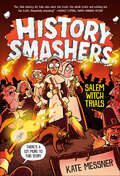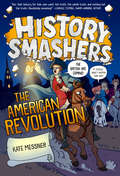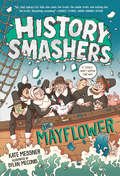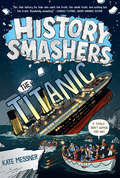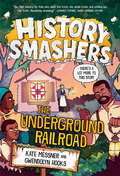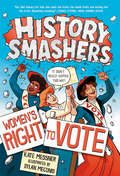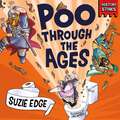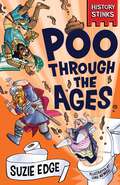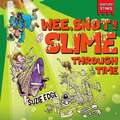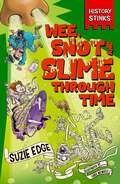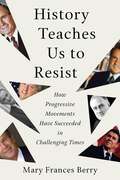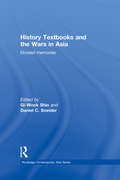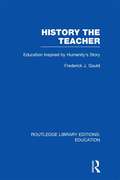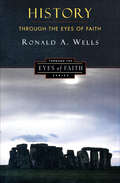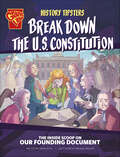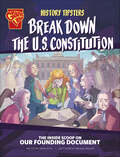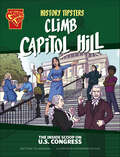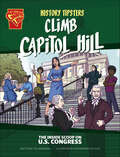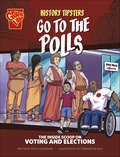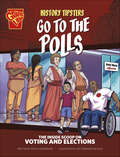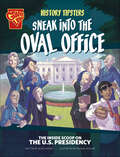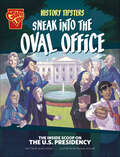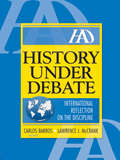- Table View
- List View
History Smashers: Salem Witch Trials (History Smashers #9)
by Kate MessnerMyths! Lies! Secrets! Uncover the hidden truth about the Salem Witch Trials in the hit History Smashers nonfiction series. Perfect for fans of the I Survived books and Nathan Hale's Hazardous Tales.In 1692, a few paranoid Puritans accused their neighbors of being witches sending the town flying off the (broomstick) handle. Before it was all over, dozens of women in Salem, Massachusetts were executed—burned at the stake. RIGHT?WRONG! There was some serious witch worry, but no one in the United States was put on a pyre (though the truth isn't much better). And women weren&’t the only ones caught in crossfire…maybe don&’t read this one aloud to your dog.What really happened? The truth is historians aren&’t totally sure. But it is certain that religious beliefs, a changing world, and a few super nosy neighbors collided to spell disaster for one New England town. No joke!From award-winning author Kate Messner comes the acclaimed nonfiction series that demolishes everything you thought you knew about history. And bust more puzzles of the past in History Smashers: Christopher Columbus and the Taino People, The Mayflower, and The Underground Railroad among others!
History Smashers: The American Revolution (History Smashers)
by Kate MessnerMyths! Lies! Secrets! Uncover the hidden truth behind the Revolutionary War with beloved educator/author Kate Messner. The fun mix of sidebars, illustrations, photos, and graphic panels make this perfect for fans of I Survived! and Nathan Hale's Hazardous Tales.On April 18, 1775, Paul Revere rode through Lexington and Concord, Massachusetts, shouting, "The British are coming!" to start the American Revolution.RIGHT?WRONG! Paul Revere made it to Lexington, but before he could complete his mission, he was captured!The truth is, dozens of Patriots rode around warning people about the Redcoats' plans that night. It was actually a man named Samuel Prescott who succeeded, alerting townspeople in Lexington and then moving on to Concord. But the Revolutionary War didn't officially start for more than a year after Prescott's ride. No joke.Discover the nonfiction series that smashes everything you thought you knew about history. Don't miss History Smashers: The Mayflower, Women's Right to Vote, Pearl Harbor, and Titanic.
History Smashers: The Mayflower (History Smashers)
by Kate MessnerMyths! Lies! Secrets! Smash the stories behind famous moments in history and expose the hidden truth. Perfect for fans of I Survived and Nathan Hale's Hazardous Tales.In 1620, the Pilgrims landed at Plymouth Rock and made friends with Wampanoag people who gave them corn. RIGHT? WRONG! It was months before the Pilgrims met any Wampanoag people, and nobody gave anybody corn that day.Did you know that the pilgrims didn't go straight from England to Plymouth? No, they made a stop along the way--and almost stayed forever! Did you know there was a second ship, called the Speedwell, that was too leaky to make the trip? No joke. And just wait until you learn the truth about Plymouth Rock.Through illustrations, graphic panels, photographs, sidebars, and more, acclaimed author Kate Messner smashes history by exploring the little-known details behind the legends of the Mayflower and the first Thanksgiving. "Kate Messner serves up fun, fast history for kids who want the truth, the whole truth, and nothing but the truth. Absolutely smashing!" --Candace Fleming, award-winning authorDon't miss History Smashers: Women's Right to Vote!
History Smashers: The Titanic (History Smashers)
by Kate MessnerMyths! Lies! Secrets! Uncover the hidden truth behind the sinking of the Titanic with beloved educator/author Kate Messner. The fun mix of sidebars, illustrations, photos, and graphic panels make this perfect for fans of I Survived! and Nathan Hale's Hazardous Tales.On April 15, 1912 an "unsinkable" ship called the Titanic unexpectedly hit an iceberg and sank to the bottom of the North Atlantic. Right?Wrong! Nobody was really talking about the Titanic being unsinkable until after it sank.The truth is, four different ships wired the Titanic to report icebergs and field ice in the area. But the Titanic never slowed down. In fact, when the Californian warned that it was trapped in ice, the Titanic's wireless operator was so busy sending outgoing messages that he replied, "Shut up!" No joke.Discover the nonfiction series that demolishes everything you thought you knew about history.Don't miss History Smashers: The Mayflower, Women's Right to Vote, and Pearl Harbor.
History Smashers: The Underground Railroad (History Smashers #7)
by Kate Messner Gwendolyn HooksMyths! Lies! Secrets! Uncover the hidden truth about the Underground Railroad and Black Americans' struggle for freedom. Perfect for fans of I Survived! and Nathan Hale's Hazardous Tales.Before the Civil War, there was a crack team of abolitionists who used quilts and signal lanterns to guide enslaved people to freedom. RIGHT? WRONG! The truth is, the Underground Railroad wasn't very organized, and most freedom seekers were on their own. With a mix of sidebars, illustrations, photos, and graphic panels, acclaimed author Kate Messner and coauthor and Brown Bookshelf contributor Gwendolyn Hooks deliver the whole truth about the Underground Railroad.Discover the nonfiction series that smashes everything you thought you knew about history!
History Smashers: Women's Right to Vote (History Smashers)
by Kate MessnerMyths! Lies! Secrets! Smash the stories behind famous moments in history and expose the hidden truth. Perfect for fans of I Survived and Nathan Hale's Hazardous Tales.In 1920, Susan B. Anthony passed a law that gave voting rights to women in the United States. RIGHT?WRONG! Susan B. Anthony wasn't even alive when the Nineteeth Amendment was ratified. Plus, it takes a lot more than one person to amend the constitution.Did you know that when women's rights activists picketed President Wilson to get his support for voting rights, some men beat them up, tore down their banners, and stole from them? And then it was the women who got arrested! No joke.Through illustrations, graphic panels, photographs, sidebars, and more, acclaimed author Kate Messner smashes history by exploring the little-known details behind the fight for women's suffrage.Don't miss History Smashers: The Mayflower!
History Social Science: Communities (California Edition)
by Herman J. Viola Sarah Witham Bednarz Carlos E. CortesThis book is a research-based curriculum that focuses on developing students' conceptual understanding and skills through step-by-step instruction.
History Solved Paper I Competitive Exam
by Indic TrustThis is a compilation of questions answer of Civil Service Examination History Solved Paper I.
History Stinks!: Poo Through the Ages (History Stinks!)
by Suzie EdgeWhat's that smell? It's HISTORY - and it STINKS!Did you know that you can discover loads about history just from the loo? Or piles about the past just from a poo? If not, then get ready to discover everything from Henry VIII's dodgy diet and poo-tastic Roman plumbing, to the stinky secrets of Victorian sewers and how life, death and everything in between can hang on the humble number two.From Saxons and Tudors to Ancient Greece, the Indus Valley, Aztecs and beyond, Poo Through the Ages features mighty monarchs, bonkers battles, deadly diseases, fossilised faeces and poo, poo, poo. Packed with fascinating facts, hilarious illustrations and the smelliest stories from our pongy past, get ready to dive into the smelliest corners of history!
History Stinks!: Poo Through the Ages (History Stinks!)
by Suzie EdgeWhat's that smell? It's HISTORY - and it STINKS!Did you know that you can discover loads about history just from the loo? Or piles about the past just from a poo? If not, then get ready to discover everything from Henry VIII's dodgy diet and Aztec poop canoes to giant, fossilizsed Viking plops, poo-tastic Roman plumbing, the stinky secrets of Victorian sewers, smelly cesspits, medieval muck and more.From Saxons and Tudors to ancient Greece, the Indus Valley and beyond, Poo Through the Ages features mighty monarchs, bonkers battles, deadly diseases, foul-smelling faeces and poo, poo, poo. Packed with fascinating facts, hilarious illustrations and the smelliest stories from our pongy past, get ready to dive into the smelliest corners of history!
History Stinks!: Wee, Snot and Slime Through Time (History Stinks! #2)
by Suzie EdgeWhat's that smell? It's HISTORY - and it STILL STINKS!Did you know that ancient Romans used wee as mouthwash? GROSS! Or that snot was behind some of history's greatest discoveries? HUH?From French kings with boils on their bums to Victorians who liked to catch tears in special bottles, Wee, Snot and Slime Through Time features deadly battlefield diseases, disgusting dukes, beastly bacteria and slimy stories from the Egyptians to the Tudors and beyond.Packed with fascinating facts, hilarious illustrations and the snottiest, wee-tastic tales from our pongy past, get ready to be dunked into the foulest corners of history.
History Stinks!: Wee, Snot and Slime Through Time (History Stinks! #2)
by Suzie EdgeWhat's that smell? It's HISTORY - and it STILL STINKS!Did you know that ancient Romans used wee as mouthwash? GROSS! Or that snot was behind some of history's greatest discoveries? HUH?From French kings with boils on their bums to Victorians who liked to catch tears in special bottles, Wee, Snot and Slime Through Time features deadly battlefield diseases, disgusting dukes, beastly bacteria and slimy stories from the Egyptians to the Tudors and beyond.Packed with fascinating facts, hilarious illustrations and the snottiest, wee-tastic tales from our pongy past, get ready to be dunked into the foulest corners of history.
History Teaches Us to Resist: How Progressive Movements Have Succeeded in Challenging Times
by Mary Frances BerryHistorian and civil rights activist proves how progressive movements can flourish even in conservative times.Despair and mourning after the election of an antagonistic or polarizing president, such as Donald Trump, is part of the push-pull of American politics. But in this incisive book, historian Mary Frances Berry shows that resistance to presidential administrations has led to positive change and the defeat of outrageous proposals, even in challenging times. Noting that all presidents, including ones considered progressive, sometimes require massive organization to affect policy decisions, Berry cites Indigenous peoples' protests against the Dakota pipeline during Barack Obama's administration as a modern example of successful resistance built on earlier actions.Beginning with Franklin D. Roosevelt, Berry discusses that president's refusal to prevent race discrimination in the defense industry during World War II and the subsequent March on Washington movement. She analyzes Lyndon Johnson, the war in Vietnam, and the antiwar movement and then examines Ronald Reagan's two terms, which offer stories of opposition to reactionary policies, such as ignoring the AIDS crisis and retreating on racial progress, to show how resistance can succeed.The prochoice protests during the George H. W. Bush administration and the opposition to Bill Clinton's "Don't Ask, Don't Tell" policy, as well as his budget cuts and welfare reform, are also discussed, as are protests against the war in Iraq and the Patriot Act during George W. Bush's presidency. Throughout these varied examples, Berry underscores that even when resistance doesn't achieve all the goals of a particular movement, it often plants a seed that comes to fruition later.Berry also shares experiences from her six decades as an activist in various movements, including protesting the Vietnam War and advocating for the Free South Africa and civil rights movements, which provides an additional layer of insight from someone who was there. And as a result of having served in five presidential administrations, Berry brings an insider's knowledge of government.History Teaches Us to Resist is an essential book for our times which attests to the power of resistance. It proves to us through myriad historical examples that protest is an essential ingredient of politics, and that progressive movements can and will flourish, even in perilous times.
History Textbooks and the Wars in Asia: Divided Memories (Routledge Contemporary Asia Series)
by Gi-Wook Shin Daniel C. SneiderOver the past fifteen years Northeast Asia has witnessed growing intraregional exchanges and interactions, especially in the realms of culture and economy. Still, the region cannot escape from the burden of history. This book examines the formation of historical memory in four Northeast Asian societies (China, Japan, South Korea, and Taiwan) and the United States focusing on the period from the beginning of the Sino-Japanese war in 1931 until the formal conclusion of the Pacific War with the San Francisco Peace Treaty of 1951. The contributors analyse the recent efforts of Korean, Japanese, and Chinese scholars to write a ‘common history’ of Northeast Asia and question the underlying motivations for their efforts and subsequent achievements. In doing so, they contend that the greatest obstacle to reconciliation in Northeast Asia lies in the existence of divided, and often conflicting, historical memories. The book argues that a more fruitful approach lies in understanding how historical memory has evolved in each country and been incorporated into respective master narratives. Through uncovering the existence of different master narratives, it is hoped, citizens will develop a more self-critical, self-reflective approach to their own history and that such an introspective effort has the potential to lay the foundation for greater self- and mutual understanding and eventual historical reconciliation in the region. This book will be essential reading for students and scholars of Asian history, Asian education and international relations in East Asia.
History The Teacher: Education Inspired by Humanity's Story (Routledge Library Editions: Education)
by Frederick J GouldOrganized chronologically this volume examines education in England in the early twentieth century by discussing education through the ages, from pre-history to 1919. The author’s proposals were radical at the time of original education, although they embrace concepts which are now taken for granted in schools: that education of the "whole person" is vital; that the arts should enjoy equal prominence with the sciences; that schools are communities and that the educational experience will be richer for individuals if they work as and for a community.
History Through the Eyes of Faith: Christian College Coalition Series (Through the Eyes of Faith)
by Ronald A. WellsA Christian perspective on the major epochs, issues, and events in the history of Western Civilization.In this groundbreaking work, prominent historian Ronald A. Wells integrates Christian faith with a historical view of Western civilization. By clearly outlining the cultures of the ancient Greeks and Hebrews, the Middle Ages, the Renaissance, and the modern world, Wells illuminates our present situation and explores the major debates among historians today. The author invites the reader to apply the study of history to what “he or she already knows—that the kingdom of God and the kingdom of the world are not the same; while we dwell in both for a time, we know which one is coming, and which one we should seek first.”This comprehensive study, one of a series cosponsored by the Council for Christian Colleges & Universities, addresses questions faced by Christian students as they explore the history of Western civilization.
History Tipsters Break Down the U.S. Constitution: The Inside Scoop on Our Founding Document (History Tipsters)
by Sara LattaThe history of the United States goes back hundreds of years. In that time, the country has changed and grown a great deal. But it all began with one document. Follow historical figures in this graphic novel as they break down the U.S. Constitution and get the juiciest tips on how the document—and the nation—has changed over time.
History Tipsters Break Down the U.S. Constitution: The Inside Scoop on Our Founding Document (History Tipsters)
by Sara LattaThe history of the United States goes back hundreds of years. In that time, the country has changed and grown a great deal. But it all began with one document. Follow historical figures in this graphic novel as they break down the U.S. Constitution and get the juiciest tips on how the document—and the nation—has changed over time.
History Tipsters Climb Capitol Hill: The Inside Scoop on U.S. Congress (History Tipsters)
by Ted AndersonTake a trip to Capitol Hill, where the most important decisions in the United States are made. Jane Representative can answer all your questions. How was Congress formed? What do senators and representatives do? How do they get elected? Get a first-hand look into Congress, along with some inside tips on history with this fun graphic novel!
History Tipsters Climb Capitol Hill: The Inside Scoop on U.S. Congress (History Tipsters)
by Ted AndersonTake a trip to Capitol Hill, where the most important decisions in the United States are made. Jane Representative can answer all your questions. How was Congress formed? What do senators and representatives do? How do they get elected? Get a first-hand look into Congress, along with some inside tips on history with this fun graphic novel!
History Tipsters Go to the Polls: The Inside Scoop on Voting and Elections (History Tipsters)
by Jessica GundersonToday, the right to vote might seem like an obvious part of our democracy. But the struggle for this basic right goes back hundreds of years. Take a tour through the ages to meet the people who shaped our current elections and voting rights. Get the hottest tips on how history was made in this fun graphic novel.
History Tipsters Go to the Polls: The Inside Scoop on Voting and Elections (History Tipsters)
by Jessica GundersonToday, the right to vote might seem like an obvious part of our democracy. But the struggle for this basic right goes back hundreds of years. Take a tour through the ages to meet the people who shaped our current elections and voting rights. Get the hottest tips on how history was made in this fun graphic novel.
History Tipsters Sneak into the Oval Office: The Inside Scoop on the U.S. Presidency (History Tipsters)
by Blake HoenaPeek inside the most important office in the country! Today, the president of the United States is one of the most powerful people in the world, but before America was a country, ruling royalty was the norm. Let the U.S. presidents of the past and present lead you through the history of their office and how it changed over time in this fun graphic novel.
History Tipsters Sneak into the Oval Office: The Inside Scoop on the U.S. Presidency (History Tipsters)
by Blake HoenaPeek inside the most important office in the country! Today, the president of the United States is one of the most powerful people in the world, but before America was a country, ruling royalty was the norm. Let the U.S. presidents of the past and present lead you through the history of their office and how it changed over time in this fun graphic novel.
History Under Debate: International Reflection on the Discipline
by Lawrence J Mc Crank Carlos BarrosExamine new trends in the writing of new history-and what they mean to information science! History has been devalued, causing a lack of career prospects for historians, a decrease in vocations to the history profession, and historical discontinuity between generations. History Under Debate: International Reflection on the Discipline is a recap of the crucial Second International Historia a Debate conference, held on July 17, 1999 in Santiago de Compostela. This book details the comparative critical perspectives on history, historians, their audiences, and the coming trends that will inevitably impact information science. The in-depth examination provides innovative approaches to historians as they redefine their discipline in relation to the global society of the new millennium while presenting invaluable insights for librarians, social scientists, and political scientists.History Under Debate: International Reflection on the Discipline examines how the writing of history in the twenty-first century is revitalized by international comparative historiography, thanks to new technologies and the multinational integration processes in economy, politics, culture, and academics. The first section discusses the Historia a Debate (HaD) Forum and Movement, detailing the need for change to restore history as a vital global subject in modern times. The remainder of the book consists of reflective and comparative views on the study of history and historiography as well as history in and about Spain and its relation to the rest of the world. The book explores new ways for moving the discipline beyond sources and source criticism alone to a different concept of the historical profession as a science with a human subject that discovers the past as people construct it. Included in this book is the English translation of the HaD Manifesto-a proposal designed to unify historians of the twenty-first century and ensure a new dawn for history, its writings, and its teachings.History Under Debate: International Reflection on the Discipline includes vital discussions on: "Linguistic Turn," Postmodernism, and Deconstruction gender studies and social history objectivity and subjectivity in historical interpretation multiple views of history from differing times and places history as criticism, literature, and reconstructionHistory Under Debate: International Reflection on the Discipline is an essential resource that teaches historians, librarians, social scientists, and humanists how to use cross-border development and new global historiographic networks to bring hope for a future in history.
